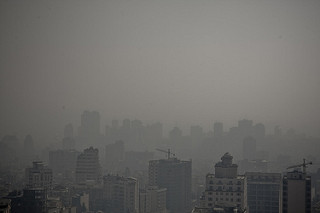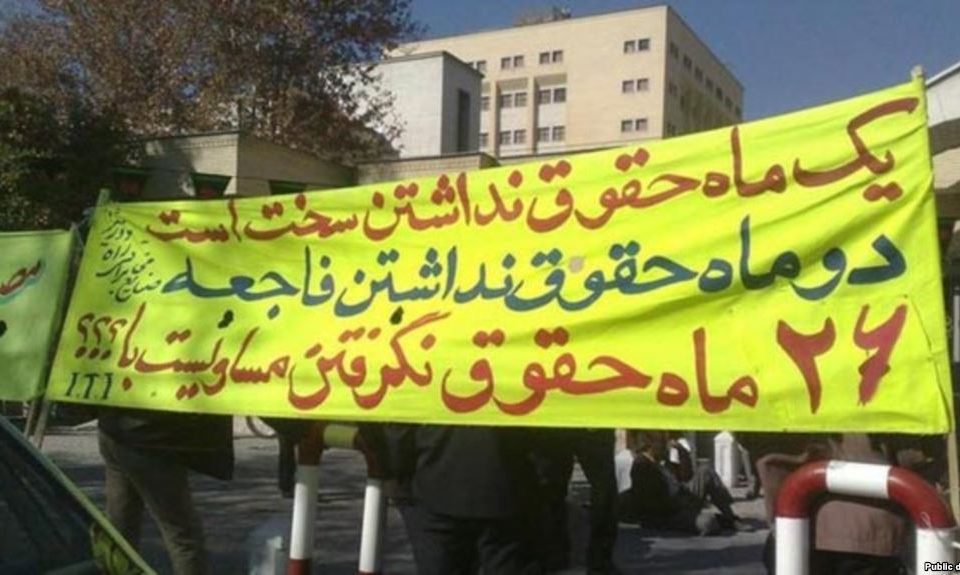
Guard Commander Predicts Unrest Due to Economy
January 17, 2013
Iran: There’s No Room to Breathe
January 23, 2013Arseh Sevom — Despite efforts to keep life-saving medicine from falling victim to sanctions, there is a shortage in Iran. “Free” elections is a hot topic while the squeeze on purchasing power worries a Revolutionary Guard Commander. Musicians find themselves behind bars and Yahoo! rolls out secure email.
Killing Us Softly: Sanctions and Iran’s Health Care Crisis
The Washington Post [en] reports on a resurgence of black market pharmaceutical near Tehran’s main bazaar.
The Guardian reports that despite the waivers for essential medicines, medication is still not making it through. For the most part, banks are unwilling to do any business at all with Iran. Al-Monitor [en] reports that it’s just become too complicated.
Shortages of chemotherapy drugs have put Iranians with serious illnesses at imminent risk. In this situation, some Iranians in the U.S. have found friendly doctors to write prescriptions for patients they have never examined — a violation of US medical regulations. Then they deliver the medicines to Iran’s neighboring countries and hand them off to a family friend, who carries them into Iran and to their relatives. This process is the only way to get relatives life-saving medicines.
The lullaby of silent war is taking the lives of ordinary people, yet the Iranian authorities do not seem to be willing to take a stand.
Free Elections: the New Buzz Word in Iran’s Political Arena
“Free elections” seems to be the new buzz word in Iran’s political arena. Just recently, Ayatollah Khamenei, Iran’s supreme leader, criticized those officials who imply that the last election was not free. As the Guardian [en] reports, Ayatollah Ali Khamenei warned the public against making “general recommendations” that would “serve the purpose of the enemy,” adding:
We’ve held more than 30 elections since the [1979] Islamic revolution, which one was not free? In which country you can see elections freer than those held in Iran?
Ali Akbar Hashemi Rafsanjani, the Energizer Bunny of Iran’s political scene, is among the officials believed to be targeted by Khamenei’s warning. Last September, he called for “free elections” to bring the country out of its malaise and deflect war.
In their support for the Leader’s declaration, supportive media outlets ended up revealing their creative methods for protecting the election. Khamenei’s representative to the Revolutionary Guards, Ali Saeedi, added that it was the “duty” of the Revolutionary Guards to “engineer” the ballot.
On January 14, 2013, Fars News Agency [fa] accused former president Mohammad Khatami of having been among leaders of sedition and now talking about free elections. On the same day, Ayatollah Ja’far Sobhani said that the president should not be elected by the direct vote of the population, asking that the parliament do so instead, Radio Farda [fa] reports.
Meanwhile, former interior ministry chief Mostafa Tajzadeh wrote another letter from Evin Prison and insisted on the necessity of holding free elections:
In the recent fanfare, we must not fear and we must stand firm with integrity for free elections, because in Iran we can either have free elections or, God forbid, an ignominious one… If I were on the outside, I would launch the biggest campaign for the defence of free elections, which is a legal and legitimate concern.
Five months remain until the next presidential elections in Iran. We should wait and see what happens in the upcoming months. However, it seems that the term free elections, if not the actual reality, is here to stay.
Reduced Purchasing Power: a New Wave of Unrest?
Revolutionary Guard commander Naser Shabani predicted unrest due to the deteriorating economic situation in Iran, saying that this time “the unrest would start from remote cities in the country rather than Tehran,” BBC Persian [fa] reports. Shabani asserted that the Revolutionary Guard is ready to confront the situation. He also predicted that politicians will use the bad economy situation to advance their campaigns during the elections. For more, click here.
Human rights activists who struggle for internet privacy are usually not accustomed to good news, but now there is some. After years of asking Yahoo! to secure its email service by adding Hypertext Transfer Protocol Secure (HTTPS) option, the company has recently begun to provide this service to its email users.
The International Campaign for Human Rights in Iran and 25 other organizations wrote a letter on November 13, 2012, asking Yahoo! to add HTTPS option to its email service. The attempts have been effective and Yahoo! added the option. The secure communications protocol will give Iranians and other Yahoo! users the ability to send and receive email communications with stronger privacy protections.
All human rights and freedom of expression benefits aside, this is good news for Yahoo! as well. After all, we are living in 2013 and people need some privacy in their online activities. It is a good business decision to ensure customer satisfaction. It is an added bonus good business and freedom of expression are aligned.
Tactical Tech produced a series of animations featuring ONO on methods of survival in the digital age. The 3rd Sphere School [fa] has dubbed and subtitled the series in Persian.
Prison Song: Songwriters Behind Bars
Five musicians were arrested in a police raid in Tehran last week, Isna [fa] reports. Tehran Bureau reports that prominent Iranian songwriter, Roozbeh Bemani, was reportedly among the five musicians charged with the “illegal production and distribution of underground music for Los Angeles-based musicians and satellite channels.”
The Iranian poet and composer Yaghma Golrouie wrote an open letter [fa] on Sunday condemning the arrests and urging Iran’s art community to take action against the government crackdown. Golrouie said he would withdraw from his 15-year career in the music business as part of a “moral obligation” to defend Bemani and the jailed musicians. “Defending Bemani is defending the country’s music industry.”
Over the past few weeks, the Iranian government has stepped up pressure on those working with foreign-based satellite channel broadcasting in Persian. Earlier in December, some 28 people were arrested for allegedly dubbing and translating programs for satellite networks abroad. It cannot be denied that Iranian artists are working in an intolerable situation. With male songwriters behind bars, God only knows what would happen if women sang.





